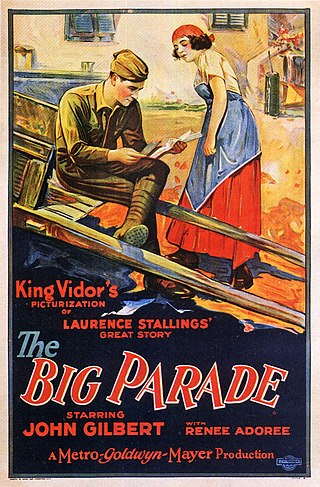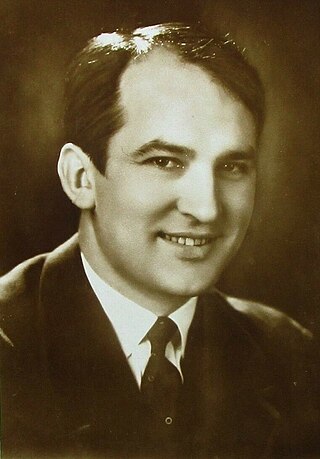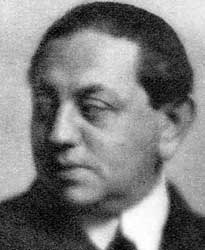This is a list of the most notable films produced in the Cinema of Germany in 1925.
This is a list of the most notable films produced in the Cinema of Germany in 1925.

The 1920s was a decade that began on January 1, 1920, and ended on December 31, 1929. In America, it is frequently referred to as the "Roaring Twenties" or the "Jazz Age", while in Europe the period is sometimes referred to as the "Golden Twenties" because of the economic boom following World War I (1914–1918). French speakers refer to the period as the "Années folles", emphasizing the era's social, artistic, and cultural dynamism.

The Big Parade is a 1925 American silent war drama film directed by King Vidor, starring John Gilbert, Renée Adorée, Hobart Bosworth, Tom O'Brien, and Karl Dane. Written by World War I veteran Laurence Stallings, the film is about an idle rich boy who joins the U.S. Army's Rainbow Division, is sent to France to fight in World War I, becomes a friend of two working-class men, experiences the horrors of trench warfare, and finds love with a French girl. A sound version of the film was released in 1930. While the sound version of the film has no audible dialog, it featured a synchronized musical score with sound effects using both the sound-on-disc and sound-on-film process.

Juliane "Liane" Haid was an Austrian actress and singer. She has often been referred to as Austria's first movie star.
The decade of the 1920s in film involved many significant films.

Oskar Homolka was an Austrian film and theatre actor, who went on to work in Germany, Britain, and America. Both his voice and his appearance fitted him for roles as communist spies or Soviet officials, for which he was in regular demand. By the age of 30, he had appeared in more than 400 plays; his film career covered at least 100 films and TV shows.

William Dieterle was a German-born actor and film director who emigrated to the United States in 1930 to leave a worsening political situation. He worked in Hollywood primarily as a director for much of his career, becoming a United States citizen in 1937. He moved back to Germany in the late 1950s.
The November Group was a group of German expressionist artists and architects. Formed on 3 December 1918, they took their name from the month of the German Revolution.

Richard Oswald was an Austrian film director, producer, screenwriter, and father of German-American film director Gerd Oswald.
Alfred Junge was a German-born production designer who spent a large part of his career working in the British film industry.
Alexander is a male given name.

Werner Johannes Krauss was a German stage and film actor. Krauss dominated the German stage of the early 20th century. However, his participation in the antisemitic propaganda film Jud Süß and his collaboration with the Nazis made him a controversial figure.

Paul Leni was a German filmmaker and a key figure in German Expressionism, making Hintertreppe (1921) and Waxworks (1924) in Germany, and The Cat and the Canary (1927), The Chinese Parrot (1927), The Man Who Laughs (1928), and The Last Warning (1928) in the United States.

Atlantic (1929) is an all-talking sound British drama film directed and produced by Ewald André Dupont and starring Franklin Dyall and Madeleine Carroll. Originally, two versions were made: the English and German-language version Atlantik were shot simultaneously. Subsequently, the production of a French version (Atlantis) began in spring 1930 using different footage and partially an altered storyline with a different director. The fourth version was released as a silent film. The story was taken from the West End play The Berg by Ernest Raymond. It was one of the most expensive films of 1929.

Carl August Hugo Froelich was a German film pioneer and film director. He was born and died in Berlin.

Frieda Ulricke "Henny" Porten was a German actress and film producer of the silent era, and Germany's first major film star. She appeared in more than 170 films between 1906 and 1955.

The Dark Angel is a 1925 American silent drama film, based on the play The Dark Angel, a Play of Yesterday and To-day by H. B. Trevelyan, released by First National Pictures, and starring Ronald Colman, Vilma Bánky, and Wyndham Standing.

The Blackguard is a 1925 British-German silent drama film directed by Graham Cutts and starring Jane Novak, Walter Rilla, and Frank Stanmore. The film is set against the backdrop of the Russian Revolution during which a violinist (Rilla) saves a princess (Novak) from execution.
Richard Brody is an American film critic who has written for The New Yorker since 1999.
Der Hexer is a 1964 West German black and white mystery film directed by Alfred Vohrer and starring Joachim Fuchsberger. It was part of a very successful series of German films based on the writings of Edgar Wallace and adapted from the 1925 novel titled The Ringer. In 1965, a sequel Neues vom Hexer was released.